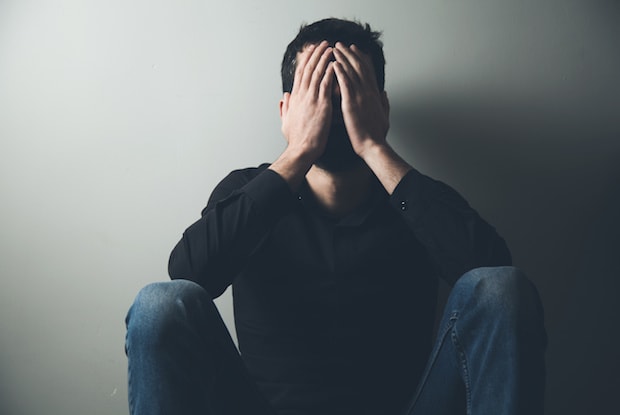Table of Contents
I. Why Do People Get Depression?
Depression is a common mood and mental health disorder. Many people are hesitant to talk about their feelings, but you may need to reach out to friends or a mental health professional if you experience chronic sadness. Depression is not the occasional bad mood, but a pervasive feeling of helplessness and hopelessness.
Your sleep patterns, professional life, eating habits, and personal relationships can be affected by depression. This can make everyday life challenging, and it may feel like life is never going to improve. Despite the feelings of hopefulness, there is lots of help out there. If you seek out professional therapies and medications like Paxil (paroxetine), Effexor XR, Wellbutrin XL (bupropion XL), or Trintellix (vortioxetine), your depressive symptoms can improve. Everyone experiences depression for different reasons, but prescription medications can improve symptoms by regulating brain chemistry. [1]
Depression is often complex and occurs for a combination of reasons. The most common reasons for depression can include: Life events: Life has many ups and downs. Over time, people typically develop coping skills to deal with highs and lows, but sometimes the lows are more extreme. If you are down on your luck and experiencing long-term unemployment, living in an abusive relationship, experiencing prolonged work stress, or loneliness, you are at high risk for developing depression. Significant events like losing a job or breaking up with a partner can also trigger depressive symptoms. Brain chemistry: Depression is a common condition, but there are still many unknowns about the relationship between depression and the brain. Sometimes, depression can be a result of a chemical imbalance in the brain. Serotonin and norepinephrine are two chemicals responsible for regulating mood, energy, and attentiveness. Too little of these hormones in the brain can cause depression. Personal factors: Several other personal variables can impact your risk of developing depression. Those with a family history of depression are more likely to develop feelings of prolonged sadness. People who also suffer from low self-esteem or worry a lot are also at a greater risk. Drug and alcohol abuse can also increase your risk of depression. [2] Depression symptoms may present themselves differently in everyone. Depression in a young adult may look completely different than depression in an older adult, but there are a few common symptoms: Depression is not a one size fits all disease. Several different types of depression can last for a long time or come and go. There are a few main types of depression, but many specific disorders fall under these larger categories' umbrella. Major depression, also known as clinical depression, is typically the most severe form of depression. Those who suffer from this condition spend most days feeling low with a loss of interest in normal activities. Major depression is diagnosed if someone experiences these feelings every day for at least two weeks. Around 6.7 percent of the United States population over the age of 18 suffers from major depression. Women are twice as likely to experience this condition as men. Men who experience major depression are less likely to seek help or talk about their feelings of hopelessness. [3] Despite the name, chronic depression is usually less severe than major depression. Chronic depression is also referred to as mild depression or dysthymia and is classified as a persistent depressive disorder. Chronic depression differs from major depression because it can occur for several years at a time. Major depression is often characterized by periods of intense depressive symptoms that often subside, while chronic depression can stick around for years and come and go throughout a person's life. Those with dysthymia may find it difficult to be upbeat on happy occasions and incapable of having fun. [4] Manic depression is also known as bipolar disorder. This mood disorder is defined by manic or hypomanic states, which involve periods of mood swings and increased energy levels. Bipolar is a serious disorder that often requires specific treatment. Bipolar disorder can also involve periods of clinical depression. Manic depression is typically diagnosed early in life, between 15 and 24, and is rarely diagnosed in adults over 65. Like major depression, bipolar is marked by periods of remission and relapses. Around 90 percent of people with bipolar 1 disorder (the more severe form of manic depression) experience at least one psychiatric hospitalization in their life. [5] As mentioned earlier, many people may push pervasive feelings of sadness aside. It is important not to ignore depressive symptoms because it can severely affect your life and increase your risk of suicide and self-harm. If you have been feeling down for a while, you can do several different things to boost your mood. It can be incredibly beneficial to reach out to loved ones for support or seek professional help. Psychotherapy (talk therapy) can help you identify and discuss the reasons behind your mood change. Trained therapists can also give you coping tools to bring yourself out of a depressive funk. [1] Depending on the type and severity of your depression, you will likely be prescribed a treatment plan that involves a combination of therapy and medications. Medications like Trintellix (vortioxetine) and Wellbutrin XL (bupropion XL) are used most commonly in treating major depression. Trintellix is a selective serotonin reuptake inhibitor (SSRI) that helps restore serotonin's balance in the brain. Serotonin helps improve mood, appetite, and energy level. [6] Paxil (paroxetine) is another common SSRI. This drug can treat various depressive conditions, including major depression, obsessive-compulsive disorder, post-traumatic stress disorder, and panic disorder. [7] Wellbutrin XL (bupropion XL) is a norepinephrine/dopamine-reuptake inhibitor (NDRI) medication. This type of medication can also be used for major depression, along with seasonal affective disorder. This drug helps keep dopamine in the brain, which can increase motivation and improve mood. Effexor XR is an antidepressant under the serotonin-norepinephrine reuptake inhibitor (SNRI) category. Effexor XR is the extended-release version of the drug. Like Trintellix, this drug delays the uptake of serotonin and norepinephrine, which is a chemical that acts as a stress hormone and neurotransmitter. Your doctor and mental health team will determine the right medication for you. [8] The content in this article is intended for informational purposes only. This website does not provide medical advice. In all circumstances, you should always seek the advice of your physician and/or other qualified health professionals(s) for drug, medical condition, or treatment advice. The content provided on this website is not a substitute for professional medical advice, diagnosis or treatment.
Why Do People Get Depression?
Symptoms of Depression

Types of Depression
a. Major Depression
b. Chronic Depression
c. Manic Depression

Treatment and Diagnosis
